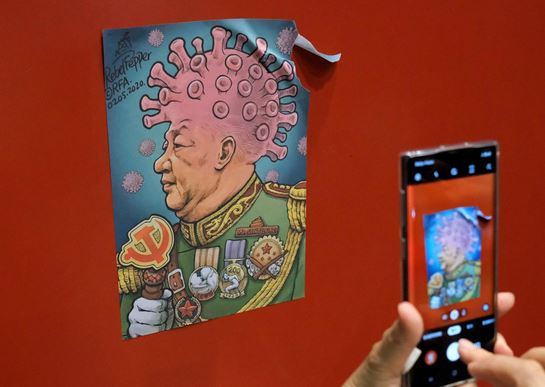Will China
replace Islam as the West's new enemy?
China is being presented as the new existential enemy,
just as Islam was 20 years ago
By Peter Oborne

A defaced picture
mocking Chinese President Xi Jinping and the coronavirus
disease in Hong Kong on 26 April (Reuters)
April 28, 2020 "Information
Clearing House" -
Itís just over a quarter of
a century since the American political scientist Samuel
Huntington wrote his famous essay on
the Clash of Civilisations. It
set the tone for a series of wars.
Huntington was writing after the fall of the Berlin
Wall, and the end of the Cold War between Soviet Russia
and the West. Rather than an era of peace, Huntingdon
forecast a new struggle between what he viewed as
irreconcilable enemies: Islam and the West.
Huntington asserted that identity, rather than
ideology, lay at the heart of contemporary politics.
"What are you?", he asked, "and as we know, from Bosnia
to the Caucasus to the Sudan, the wrong answer to that
question can mean a bullet in the head."
He added:"Islam has bloody borders."
Western politicians like former US President George
W Bush and former British Prime Minister Tony Blair
followed Huntingtonís lead. For the last
quarter century, many Muslim countries have been the
target of the US and its allies.
Meanwhile
Muslims have often been
portrayed in Western
media as lawless, radical ideologues and an existential
threat to the world. This has given rise to virulent
Islamophobia in the West with
the rise of far right
political parties in Europe.
I will
argue today that much of this noxious hostility may soon
abate in the aftermath of the
coronavirus tragedy.
This is partly because (especially in Britain)
the sacrifices made by
Muslims are so obvious and have been so great that this
may lead to a belated change in public attitudes. The
first three medical staff to die
from the outbreak were all Muslim.